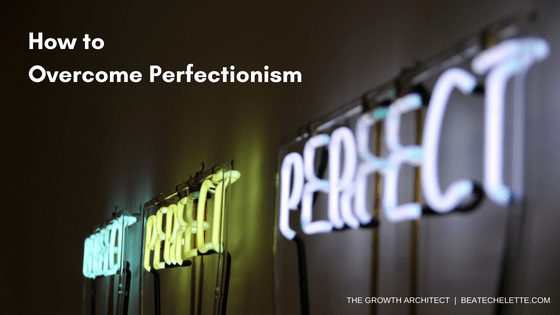As business owners we are flooded by decisions to make and tasks to accomplish ASAP. Lately, I have been writing a lot of proposals and for each one I am forced to pull out my capability statement, look at my website, review the language of my marketing brochures, and work with the boiler plate proposals I previously wrote. Because business is fluid and our messaging evolves to become clearer and more concise over time, I finally conceded that everything needs to be updated, AGAIN.
What goes out the door has to look good and be professional, but our desire for perfectionism can be overwhelming and prevent us from getting anything done at all. Let’s talk about how to overcome perfectionism.
Are you a perfectionist?
It’s a familiar scene: 11 p.m. and we are trying to fall asleep but our mind replays today’s events—what we did, whom we talked to, what we said, and how we said it. We are in a mindmovie, often a horror show, where we are the critic in the front row judging every single action. And we are not a kind and gentle judge; we are brutally harsh and unforgiving of ourselves.
With such a tsunami of negativity in our head, we toss and turn and continue to replaying the day’s events, asking ourselves questions like these:
Why am I such a failure?
Why do I keep doing this?
Why can’t I just get it right the first time?
Why do I have to keep making expensive mistakes?
If you have experienced any of this sad routine, you are suffering from perfectionism. You feel the need to appear perfect and are holding on to the belief that there is such a thing as moral or spiritual perfectionism in the first place.
The truth behind it
Truth is, perfect does not exist. Perfectionism has been used as tool to keep people in place. Because fear is such a strong emotion, it can overshadow any other positive one and keep us in check. Which is why religions, bad bosses, and underhanded partners use this as a tool. If you keep beating yourself up, they don’t have to. If you keep pointing out my flaws I will remain busy feeling badly and wanting to improve myself. I want to get THERE, to the place where everything is perfect. If this is you, you are suffering from the Superhuman Paradox.
The results are devastating and sobering. We never get to enjoy our life or what we have achieved because we immediately jump to what we have not yet accomplished, or lament about what we could have done better. Striving for perfection can also cause problems in your relationships and leave you feeling like a failure.
How to overcome perfectionism
Let’s face it, there is ALWAYS room for improvement. It can always be done better with 20/20 hindsight.
I see this a lot with highly intuitive and spiritual business owners who believe that they created absolutely everything in their lives either consciously or subconsciously on their own. Often I hear them say things like, “Why do I keep making the same mistake?” Or, “Why do I keep attracting the same type of person?” They question their ability to learn from previous mistakes or missteps.
While I do believe that we have the power of choosing and are ultimately responsible for the choices we make, let’s put this in perspective.
- You only have control over yourself. No matter how enlightened or evolved someone is, at the end of the day you are the master only of you.
- You cannot control other people or their actions. While it would be great if we can predict someone’s morals before your first deal, it’s close to impossible. And there are a lot of opportunists and schmucks in this world. Especially right now there are a whole lot of crazies who will do or say anything to get an advantage.
- Life is not about being perfect. It’s about getting stuff done and improving what we can—within reason. Because nothing can ever be truly perfect, the question you want to ask yourself is simply: is it good enough?
Good enough and out the door is better than trying to be perfect and not getting it done at all. I just created a pitch deck that three people were waiting for. It wasn’t finished or proofread. Instead of sweating about getting it all right, I sent it out with a notice that it is my first draft and not proofed, and then I invited the recipients to give me feedback. Now I don’t have to feel badly for sending out imperfect and I’ll probably receive some great advice that will make my pitch deck much better.
I encourage you to be more gentle with yourself. Please stop beating yourself up. If you can say you gave it 100% and did the best you could with what you had—let that be good enough for you. And that is how you overcome perfectionism.
Beate Chelette is The Growth Architect and a results-oriented businesswoman with an entrepreneurial spirit and a proven track record in growing, building and scaling women’s businesses. Once $135,000 in debt and a single mother, she successfully sold her business to a global entertainment media company owned by Bill Gates in a multi-million dollar deal.
Through her online courses, one-on-one training programs and live speaking events, she mentors women entrepreneurs with her 5 Star Success Blueprint, developed with the knowledge gleaned from her growing, scaling and selling her own company. Beate has a deep commitment to supporting women.
She is the creator of The Women’s Code, the fourth step of Growth Architecture that is focused on Supporting Balanced Leadership. Her proprietary methods specifically address women’s obstacles and she leads from experience, having survived in business in a highly competitive male-dominated environment.
She is a respected speaker and mentor and is the author of the book “Happy Woman Happy World How to Go From Overwhelmed to Awesome”, a book that corporate trainer and best-selling author Brian Tracy calls “a handbook for every woman who wants health, success and a fulfilling career.”





